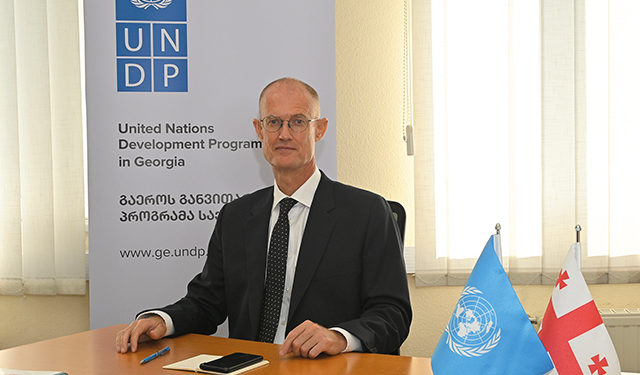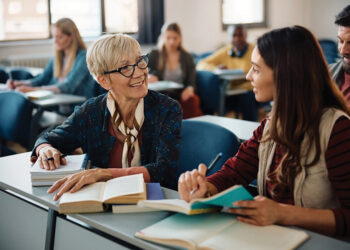Deepening and strengthening democratic governance, respect for human rights, equality and the rule of law are essential to ensure Georgia does not stall on its development journey
“One of the great privileges of working for the UN is you get to live and work in some wonderful places, and you get to know some amazing people. Georgia has transformed itself so fast over a few years into a democratic state, creating growth, lowering poverty and heading towards a prosperous inclusive future. Can that trajectory be maintained? The UNDP works to strengthen democratic governance, protect human rights, resolve conflicts and realize sustainable development goals. In Georgia, I get the sense that there is everything to play for, and so I could not look for a more engaging and I hope rewarding place to live and work.” – says Nick Beresford, the new UNDP Resident Representative in Georgia.
Nick Beresford is a development professional with over 20 years of experience with the United Nations. He was appointed as UNDP Resident Representative in Georgia in September, prior to which he served in Cambodia, Bangladesh, Somalia and East Timor, as well as in the UN headquarters in New York (USA). He holds a Master of Science in Development Economics from Sussex University and degrees in audit and accountancy and English literature. GEORGIA TODAY spoke to him to find out what his impressions are of the country, and where he sees room for the kind of improvements the UNDP excels at facilitating.
“Georgia is strikingly beautiful,” he tells us. “The city of Tbilisi is unique. History, culture and art are everywhere. The people are exceptionally warm and friendly. As a guest, you are really made to feel welcome. Georgian cuisine is a sensation, and they literally invented wine. As first impressions go, this one is very hard to beat!”
This is a challenging time for most countries. What do you see as the main priorities for Georgia to achieve economic recovery?
The health impact of COVID cannot be separated from the economic: we need to get the “R” number, the rate of infection, under 1 and moving towards zero. The science is crystal clear: we all need to get vaccinated. And keep using masks, washing hands and social distancing. As people become confident to return to work, shops and markets, so the real economy for working people can pick up.
On the social and economic side, we have learned a lot in a short time through COVID. More than 120 countries around the world introduced new social protection schemes, including here in Georgia. Social protection builds resilience so more people are kept out of poverty and in the working economy.
Expanding universal health care, another very welcome policy seen in Georgia, strengthens human capital, reduces the burden of ill health and so adds to economic growth. Just as we can’t separate the health responses from the economic response, they are complements, not alternatives, so we need to invest in people to make growth that is stronger, locked in for the long term, and shared widely, not just accruing to the wealthy.
What have you identified as the main goals for the UNDP in Georgia in the foreseeable future?
I would list four priority areas. The first rounds of local elections have just ended with a higher turnout than in previous years. I’m glad UNDP and others supported programs to encourage young voters to participate and to increase women’s engagement in decision-making. Deepening and strengthening democratic governance, respect for human rights, equality and the rule of law are essential to ensure Georgia does not stall on its development journey.
We have an opportunity here, as in many countries, for an economic recovery that emphasizes green growth. This is about protecting our health, our environment and planetary wellbeing, but it’s also about jobs. Green growth investments, dollar for dollar, bring high economic multipliers and create more jobs – and ones that take us to higher skills too.
As we cope with the pandemic, we can see that social protection investments in people have been essential to help people rise to their full potential and also to strengthen social solidarity. Georgia has come a long way in reducing poverty, now at 21.3%, and we need to keep that momentum to end poverty by 2030. When people escape poverty, they don’t just realize their human right to a life with dignity, they start to contribute to the wider economy, and this is something that benefits everyone.
Finally, I would note that many communities, including internally displaced persons, still suffer the impacts of past conflict. We must invest in these communities to ensure no-one is left behind. Confidence building measures that bring communities together can set the basis for finding ways for lasting and peaceful resolutions.
What challenges do you expect, and how can/will these be overcome?
Development agencies are often good at producing technical solutions on paper, but sometimes less impressive when it comes to seeing them into action. We need a sharper focus on the political landscape: the incentives that drive our partners in government, civil society and the private sector. If we can listen more carefully to these, we can make better choices on which doors to push and which ones are perhaps shut tight. The point is to work in partnership with government, civil society, and other development partners to find a pathway ahead so we can make real systemic change. That’s how, on a good day!, we can move bright policy ideas into real development impact.
Exclusive Interview by Katie Ruth Davies














